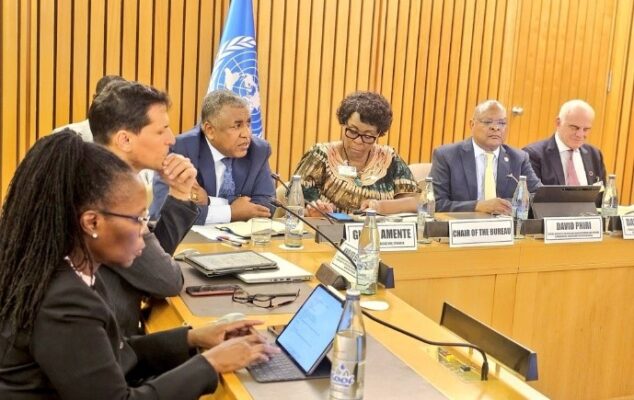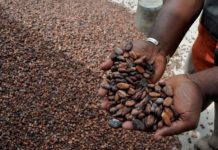
A panel of food security and agriculture development leaders agreed on key actions to improve the progress of African countries to end hunger and ensure agrifood system transformation. The proposed action points included – the need for better investments, improving infrastructure development, employing science and innovation in agriculture, building resilience to climate shocks, and reinforcing regional trade.
The key priority areas were agreed upon at the Zero-hunger parallel session of the tenth African Regional Forum on Sustainable Development (ARFSD 10) on 24 March 2024 in Addis Ababa, Ethiopia. African Ministers for Agriculture, heads of United Nations agencies and representatives of international and regional development organizations attended the session.
In his opening remarks, Girma Amenti, Minister for Agriculture of Ethiopia, presented the good practices of agriculture in his country and highlighted the importance of focusing on key priority areas, as Ethiopia has done with the wheat crop in the first instance. He added, “Ethiopia is expanding the level of agricultural commercialization; and is using a cluster approach to better support small-scale farmers, including with mechanization and local financing opportunities”.
Moderating the panel discussion, Chimimba David Phiri, the Food and Agriculture Organization of the United Nations (FAO) Special Adviser to the Assistant Director-General and Regional Representative for Africa, stressed the role of increasing productivity in the agrifood system. “According to the African Union Fourth Biennial Review of Malabo Commitments, none of the countries in Africa are on track to reach zero hunger by 2025. Meanwhile, land use planning indicates that Africa cultivates more than double the land area of the European Union, and yet, owing to low productivity, we are net food importers, including from the same European Union countries. We must also adopt a multi-sectoral and holistic approach to food security and agriculture initiatives to transform agri-food systems,” he added.
Presenting the agriculture and food security context of Africa, Medhat Elhelepi, Economic Affairs Officer for the Economic Commission for Africa (ECA), stated that according to the Africa – Regional Overview of Food Security and Nutrition 2023 report, the prevalence of moderate or severe food insecurity increased from 45 per cent in 2015 to 61 per cent in 2022. The number of people in Africa facing hunger has grown from 271 million in 2021 to 282 million in 2022.
Evidence shows that Africa is not currently on track to achieve Sustainable Development Goal 2 by 2030, let alone being poised to meet the commitment made in the Malabo Declaration to end hunger by 2025. This fact also jeopardizes the potential achievement of other Sustainable Development Goals, as SDG 2 is a prerequisite and accelerator for all the other SDGs. With six years remaining before 2030, it is necessary to accelerate action towards meeting Sustainable Development Goal 2.
Following detailed discussions, the food security and agriculture experts agreed on agrifood system transformation key actions to help countries and development actors make faster progress to meet food security targets.
The key actions are (a) implementing and continuously refining policies and institutions to create a business and public service environment conducive to the realization of the right to food for all; (b) investing in infrastructure development; (c) building resilience to shocks, including the long-term effects of climate change, and adopting sustainable farming practices; (d) tapping into opportunities unleashed by technological advancement, innovative solutions and partnerships; (e) adopting a holistic, multi-sectoral approach to advancing agrifood system transformation and the other five transitions that are required to ensure food and nutrition security for all; and (f) boosting enablers within the African context including securing land rights, women empowerment, agricultural mechanization, taking full advantage of the African Continental Free Trade Area, and strengthening agri-entrepreneurships, regional value chains and agro-industrialization. The action points will be part of the ARFSD outcome report.
ARFSD 10 dialogues on food systems and innovative agricultural financing
Prior to the parallel session on SDG 2, FAO and ECA jointly organized a side event titled ‘Harnessing the potential of innovative financing towards an Africa free of hunger and sustainable, resilient agrifood systems’. The event reviewed current financing trends and called for the mobilization of domestic financing as one of the best solutions to revamp agrifood systems transformation in Africa. Moderated by Farayi Zimudzi, FAO Subregional Coordinator for Eastern Africa, the side event came to the conclusion that Africa’s overreliance on external financing introduced vulnerabilities due to the prevailing global challenges and fluctuating donor priorities.
Diversifying financing sources through, among others, public-private partnerships and leveraging remittances can inject much-needed capital into agriculture and rural development, promoting resilience and sustainability in Africa’s agrifood systems. The meeting reviewed primary financing challenges hindering the effective implementation of National Agricultural Investment Plans (NAIPs) and proposed innovative mechanisms for financing in agrifood system transformation.
Ahead of both the side event and parallel session, the Food Systems Conveners Forum on the Food Systems transformation review, an ARFSD pre-event was organized by the Food Systems Coordination, FAO and ECA. David Phiri, speaking for FAO during the opening session, proposed research and innovation as a critical role player in enhancing productivity, resilience, and sustainability within African food systems. He also stressed the importance of sustainable agricultural practices in mitigating environmental degradation and building resilience against future challenges; improving market access within the continent and beyond, to stimulate economic growth.
The 2024 ARFSD was organized under the theme ‘Reinforcing the 2030 Agenda for Sustainable Development and Agenda 2063 and eradicating poverty.’
Related Links:








